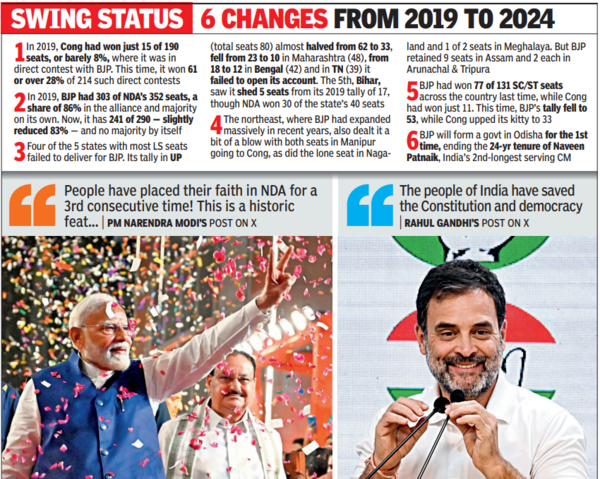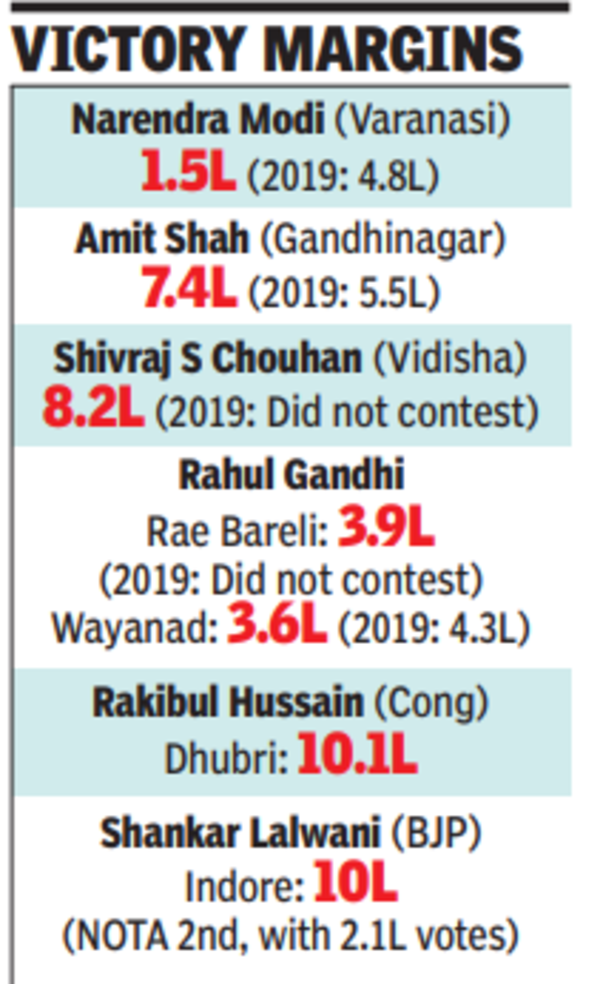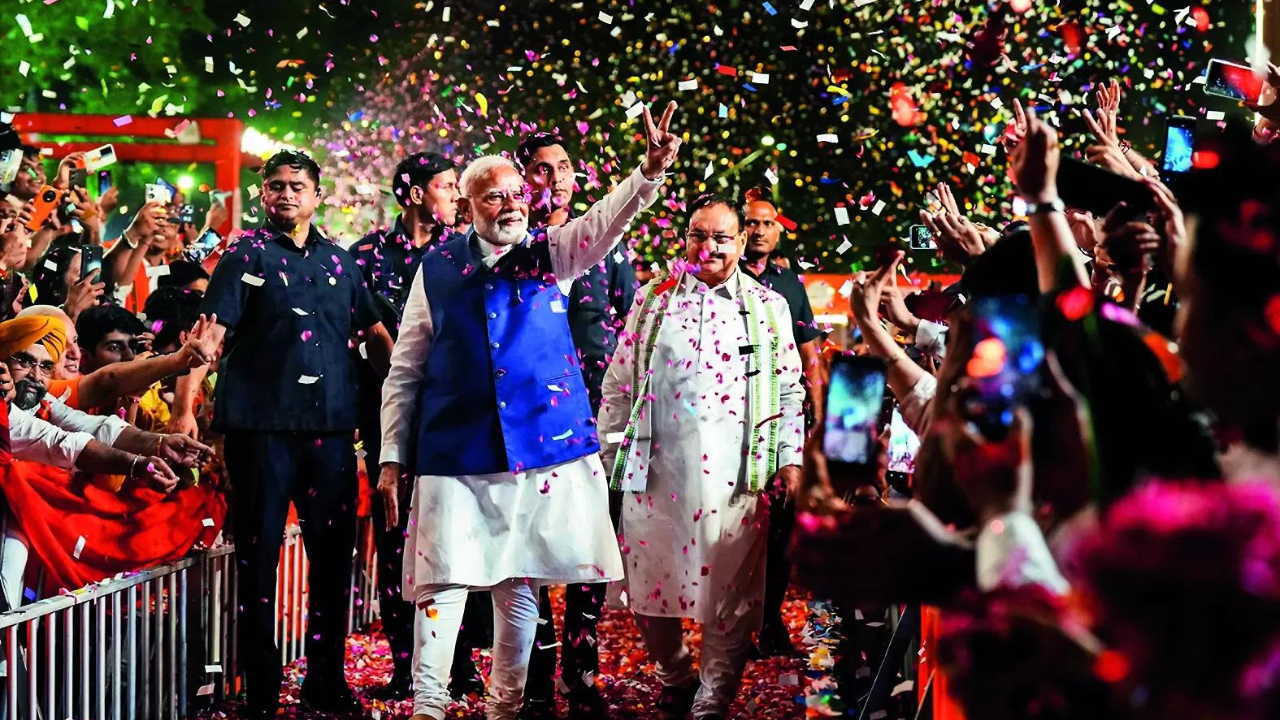LS polls 2024: New realities may make PM Modi tweak game but not faze him
NEW DELHI: Narendra Modi is set to take over as PM for the third time in a row, but suffered a setback as an unexpectedly strong show by Congress, Samajwadi Party and Trinamool Congress denied him a Lok Sabha majority.
The drop of 60-plus seats was caused by losses inflicted by Akhilesh Yadav‘s SP in the saffron stronghold of UP, which had played a crucial role in Modi’s previous two victories; smart teamwork by Congress, Uddhav Thackeray and Sharad Pawar in Maharashtra; and Mamata Banerjee’s successful defence of her Bengal bastion.
BJP managed to dodge a debacle because of its victory in Odisha, the sweep of Andhra Pradesh by its ally TDP and by saving its strongholds of Gujarat and Madhya Pradesh from being breached. It also performed well in Assam, Chhattisgarh, Jharkhand and, along with ally JD(U), retained its dominance in Bihar.
The failure to secure an absolute majority and the resultant return of coalition politics dampened celebrations of Modi’s success in becoming the first PM to secure three consecutive terms since Jawaharlal Nehru in 1962. BJP’s score of 241, while distinctly underwhelming when viewed through the prism of the previous two single-party majorities and the 400+ target Modi had set for himself, is still a creditable performance for a govt facing 10-year incumbency.
Lok Sabha Elections
Assembly Elections

The loss of majority leaves BJP dependent on allies — both bigger like TDP (16) and JD-U (12) as well as smaller ones like Chirag Paswan’s LJP. All three promptly pledged support to Modi.
But both Chandrababu Naidu and Nitish Kumar are known for their transactional outlook and maximalist approach. The lurking possibility of them using their leverage, encouraged further by feelers from Congress and others in the opposition, is going to be a constant worry for BJP.
New realities may make Modi tweak game but not faze him
The new realities of coalition politics will mark a sharp change from the first two terms, when BJP’s own numbers cushioned it from pulls and pressures from NDA partners.
In any case, the party will be faced with a ‘difficult’ Lok Sabha because of the jump in opposition’s numbers and the new-found bounce in their step.
In their post-verdict comments, Rahul Gandhi and Congress president Mallikarjun Kharge loudly proclaimed their intent by claiming that PM Narendra Modi had suffered a moral defeat and needed to quit. Akhilesh, who played the caste card with precision, Mamata, Uddhav and Pawar will be more than ready to supplement Congress’ aggression.
The changed complexion of the Lok Sabha, the return of coalition govt in the real sense of the term, and the revival of caste factor in Uttar Pradesh and pockets of Rajasthan and Haryana mark the return of politics that was the norm until Modi’s two consecutive landslides.
All these may be constraints for Modi, requiring him to calibrate his game, but may not necessarily faze him. In his address to party workers, he reiterated that his new term will be one of “historic decisions”.

“This is Modi’s guarantee,” he stressed while signaling the likelihood of steps particularly aimed at women, the poor, Dalits and tribals.
His statement that the year marks the 350th anniversary of the coronation of Chhatrapati Shivaji also struck many as significant.
The shrinking gap with the opposition in a contest largely perceived to be stacked in the incumbent’s favour was largely because of the performance of SP-Congress combine in Uttar Pradesh. The two partners managed to expand their support beyond the ‘MY’ constituency to build a larger coalition that also included a significant number of non-Yadav backwards. They also managed to lure in large sections of Dalits, feeling disappointed with Mayawati, by successfully painting BJP’s 400+ target as an anti-quota plot.
As a result, election in vast swathes of the state, which accounts for 80 Lok Sabha seats got localised with caste prevailing over BJP’s larger themes of nationalism, Hindutva and development.
But the result also brought out Modi’s resilience. BJP swept diverse geographies — from MP and Delhi to Uttarakhand and Himachal Pradesh — and posted impressive victories in Chhattisgarh, Assam and Jharkhand.
The Modi factor’s pull was also manifest in the breakthrough in Kerala with BJP candidate Suresh Gopi recording the party’s first-ever LS victory in the state, which has all along seen bipolar contests between Congress and Left. Despite the loss of seats, BJP retained its dominance in Rajasthan and, along with JD(U), in Bihar.
But the results underscore the strongest challenge that Modi has had to face since he moved to the Centre in 2014. The opposition’s resolve to reduce him to a ‘normal’ PM and his response should make for an intense duel. Society, economy and polity will all feel the impact.
